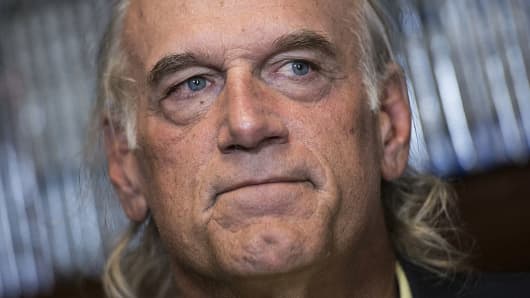Yes, Iceland's president is the head of state and although he doesn't hold the same position as ours does, he is the only elected position chosen by the entire country. The president appoints the prime minister, who is the head of government, and the president does have a form of vetoing power. The point is this: The position is important enough for the fact that Jóhannesson ran without any party affiliation whatsoever to really matter.
To this day, president-elect Guðni Jóhannesson says he does not support any particular political party. What are his qualifications? He is an expert on political history, diplomacy, and Iceland's constitution. That's all it took for him to win with 39.1 percent of the vote, and he wasn't the only person running for president without party affiliation. Halla Tómasdóttir, a businesswoman, came in second place with 27.9 percent, and she also ran independent, without any party affiliation.
Imagine that! The people of Iceland actually had to become educated about what their presidential candidates stood for prior to voting for them.
Folks, Iceland's presidential elections took place on June 25, 2016, and there were 10 people on the ballot running for president! And in previous years, there have never been more than six presidential candidates on the ballot. Iceland has a population of 330,000 people and they've had as many as six people running for president prior to 2016? Yet here we are, the supposed leaders of the free world, limiting ourselves to two corrupt political parties because we don't believe a third option could win? In Iceland, there are so many political parties that the parliament has no choice but to compromise and work together. They have to form alliances in order to get anything done!
Granted, I know Iceland is a smaller country than the U.S. and I know their population demographics are much different, but wouldn't it make more sense that, in a smaller country, there would be far less choices than in a larger one? You could easily say why on earth would Iceland need that many political parties? Wouldn't that just divide the small country unnecessarily? Yet the divisions cause them to come together to find common ground.
Could you imagine if there were so many political parties in the U.S. that Congress saw a benefit in coming together to pass legislation — and that legislation would therefore represent what all the people actually wanted? Well, if We the People start to vote for third parties, then this will actually happen. I think of Iceland as a small-scale model for what we could accomplish if we stopped believing only two political parties are capable of running our country. I don't know who started that philosophy, but it's pathetically stupid. And for the record, I'm case in point as to how a third party can win: I ran for governor of Minnesota under the Reform Party against the Democrats and the Republicans. They both outspent me and they both were beating me in the polls, but enough people showed up and voted for me and I was elected. It's really that simple.
And how will the new president of Iceland, who has no party affiliation, be able to work with the system as a complete outsider?
He says that since he has no political bias, he'll be able work with everyone equally to do what's best for Iceland! So maybe we should really be working to abolish all political parties completely. If you don't go into office with an agenda — an agenda that is dictated to you by the special interest groups that got you elected in the first place — then you do what's best for the people. But first thing's first: This November, the time has come to vote for the third option.
Commentary by Jesse Ventura, the former governor of Minnesota and the author of several books including "Sh*t Politicians Say: The Funniest, Dumbest, Most Outrageous Things Ever Uttered by Our Leaders" (July 12, 2016) and "Jesse Ventura's Marijuana Manifesto" (Sept. 6, 2016). He was a Navy SEAL and is a Vietnam veteran. He was also a professional wrestler from 1975 to 1986 under the ring name Jesse "The Body" Ventura. Follow him on Twitter@GovJVentura.
For more insight from CNBC contributors, follow
@CNBCopinion
on Twitter.



